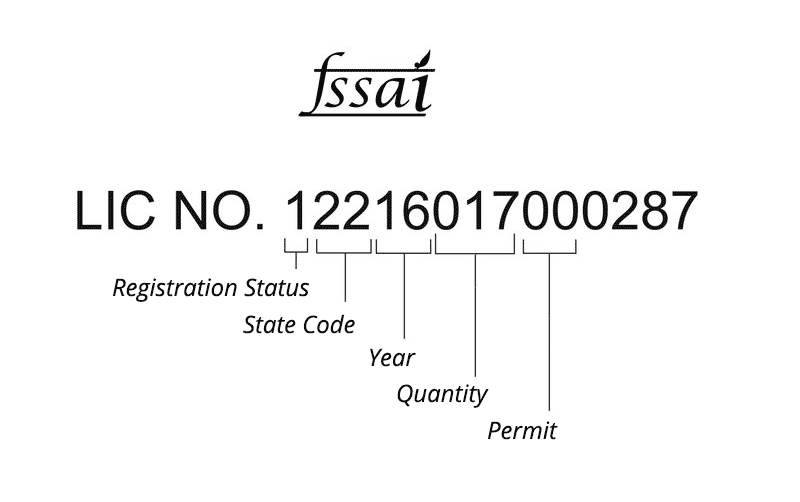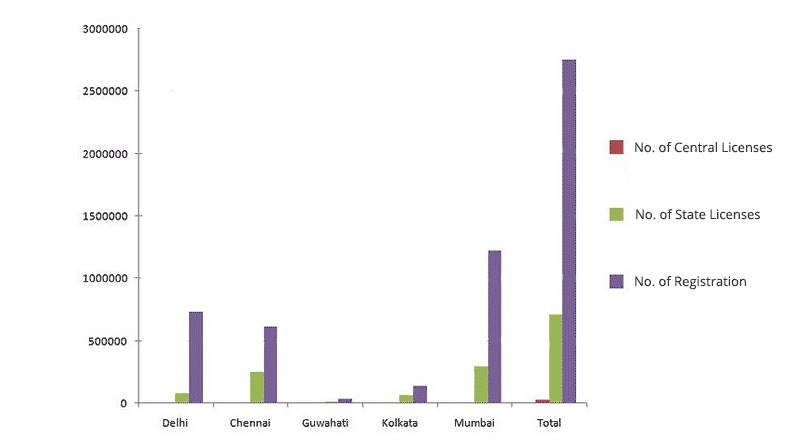What is FSSAI and How to Obtain Food License in India?
November 30, 2018 by Archi Bhatia
FSSAI stands for Food Safety and Standard Authority of India. It is responsible for setting standards for food distribution and manufacturing and is mandatory for every operator irrespective of their scale of business.
Fssai was created to lay down the science-based standard for articles of food and to regulate their manufacturing, distribution for consumption among 130 crore citizen of India. FSSAI department is controlled directly by the Ministry of Health and Family Welfare which provides 14 digit registration number to the applicant on successful registration.
What does FSSAI Licence Number Represent?
The food license number is a 14 digit number that is issued to all FBO irrespective of their turnover or scale of business. The 14 digit number has 5 sections, and each section represents the following:

- First Digit: Registration status of the food business
- Second and Third Digit: Code of the state in which the food operations are performed
- Fourth and Fifth Digits: Year in which the food product is manufactured
- Sixth, seventh and Eighth Digit: Quantity of enrolling
- Ninth and Tenth Digit: Permit number granted to the maker or manufacturer
Types of FSSAI Licences in India

There are 3 different types of food licences in India, and the food operators need to apply for the license based on the scale of the operation.
Basic Fssai Registration
The state government issues basic FSSAI registration for Food processing unit having turnover less than 12 lakh rupees. The certification is issued for a term of 1 year and can be obtained for a maximum period of 5 years.
State FSSAI License
The government issues a state license for Food Business Operators(FBO) that have a turnover of more than 12 lakh rupees. Respective state government grants the licence and for a period, not more than 5 years.
Central FSSAI License
Central FSSAI license is issued to Large-scale FBO processors that have turnover more than 20 crores. For instance importers or operators working for central government, airports seaports etc. The central government enforces the licence.
FSSAI Registration Procedure
The applicant needs to submit the legally acceptable documents with the FSSAI authorities along with the prescribed fees to obtain FSSAI registration. The costs may vary based on the turnover of your company or business; it may go up to Rs. 7000 for a single year.
Step-1
FSSAI registration process starts with the submission of Form-A for obtaining registration whereas Form-B is used for getting a license to establish food safety and standard in India.
Step-2
Once the application form is submitted online, the applicant has to provide all the supporting documents with the FSSAI form.
Step-3
The department examines the application submitted with them within 7 days. The date on which the application is accepted or rejected the applicant receives written notification in both the cases.
Step-4
In case of acceptance, the FBO receives the registration certificate which has to be displayed at all times on the place where he operates. The certificate includes the photo of the operator along with the 14 digit registration number.
Remember: The applicant can choose a maximum of a 5-year registration and henceforth will have to renew his application.
Other Licences and Registrations for food businesses
Every food business needs a hoard of licenses other than FSSAI to incorporate and continue with the business to satisfy the consumers as well as the standards set by the government of India. FBO's need to obtain at least one or more of the following licenses and registration based on the type of operations:
GST Registration
India incorporated a unified taxation system all over Indian territory. Every food product and services have now been listed down under different rate structure, and hence the business operator needs to obtain GST registration before beginning his/her food operations. You always have an option to avail composition scheme if the turnover of your business is lower than 20 lakh per annum.
Trade Licence
Trade license is a permission that is mandatory. It is permission taken to perform a particular commercial activity in a geographical activity.
Shops and Establishment Registration
Shops and establishment registration is necessary for all food business operations for the state in which you operate.
Liquor and Bar license
If your restaurant serves liquor along with food product, it is mandatory to obtain the license from the state government to serve luxury items such as alcohol. Remember the GST charged on the alcohol for consumption is different as compared to the normal food service.
NOC from Fire Department
As per the Fire Services Act, you need to obtain permission or no objection certificate from the fire department. Following documents need to be submitted with the fire department:
- 2 sets of building plan as specified in the bye-laws of the building
- A model of the building
- certification from the chief architect
Registration Cost
You can complete the entire FSSAI application with 4 simple steps and approximate government fee of Rs. 7,500 for one 1 year of registration. Fssai license cost differs for each type and number of years the license is obtained for.
Following is the cost breakup of FSSAI registration.
|
|
Government Fees |
Quickcompany |
Attorney / professional |
|
Basic Registration |
Rs100 |
Rs.1,999 |
Rs.5000 |
|
State license |
Rs. 5000 |
Rs.8,999 |
Rs.30,000 |
|
Central license |
Rs 7,500 |
Rs. 15,999 |
Rs. 20,000 |
The cost of the FSSAI license is to be paid online and is not refundable.
Food License Eligibility Criteria
List of Food businesses under the purview of FSSAI licensing
- Dairy unit
- A vegetable oil processing unit
- Slaughterhouses
- Meet processing Unit equipped to handle 500 kg per day.
- Export-oriented Unit
- Food business operator operating in two or more states
- Food catering services under central government agencies
List of Food businesses under the purview of FSSAI Registration
- Manufacturer, petty retailer or any temporary stall holder.
- Procurement, handling and distribution of 500 litres of milk per day.
- Slaughtering house with a capacity of 2 large animals or 10 small or 50 poultry animals.
Validity of Food License
Irrespective of the type of food licence the term of validity ranges from 1 to 5 years. Where the applicant has to file for renewal of the FSSAI license. The renewal needs to be made within 30 days of the expiry of the existing licence.
FSSAI Returns
Every food manufacturer whether it is a packer, re-labeller or importers have to keep track of their transactions and stock. The annual return for FSSAI can be filed both physically and through an online procedure through Form D-1 before 31st May every year. The following information is to be filed
- Name of the product produced or manufactured
- Quantity and size of the product
- selling price per unit or per KG
- The quantity of product imported or exported along with the details of the country.
Exemptions
As per the regulations every food business operator has to file an annual return, but certain few operations have been exempted from the list. This list was issued based on the notification issued on 10th June 2014 which include small eateries, fast food joints, grocery stores and canteens.
Food License Renewal
FSSAI is mandatory compliance and requires renewal based on the number of years you have obtained registration for. The maximum number of a period for which an FBO can get a license is 5 Years.
The application for renewal needs to be made before the expiry of the existing license, or else the FBO will be charged a penalty of Rs. 100 per day.
Benefits Of FSSAI
For the business operator, it is necessary to obtain an FSSAI licence before starting any food business operation. It is one of the mandatory legal compliance for every food processing unit, whether it deals in manufacturing, selling or in the distribution of the food material.
Here are some of the benefits of FSSAI registration:
Customer Knowledge
In recent time food hygiene has come under scanner with cases such as Maggie and the cases of allergy attacks; as was seen in the case of Burger King; the food safety standards are being taken seriously. It is mandatory for all food operators to comply or else heavy penalty is imposed.
Note: Allergen advice on the food product and premise has been made necessary.
Expansion of Business
Fssai licence can help you in future to expand your business in other states as well. You can also obtain loans for your operation/business easily through Fssai licence. Valid food licence will instil a sense of trust in the mind of the consumers and hence would help you establish your grounds easily.
Legally Sound Decision
Use of FSSAI logo on your menu and packaging bags instils confidence in the mind of the user and assures the hygiene and quality of the food being sold or manufactured. Moreover, the actual cost of registration is way lower than what will be charged as penalty.
Hence it is always advised to food business operators to get FSSAI Licence before officially starting the business.
Penalties for Non-compliance
The Fssai registration process is mandatory and requires compulsory compliance on the part of the operator or else they are charged heavy penalty.
If any person who sells distributes or manufactures goods and substance of substandard quality or that are not in compliance with the FSSAI act will be charged penalty up to 10 lakh. In case the substandard food causes any injury the food operator needs to pay the compensation prescribed within 30 days.